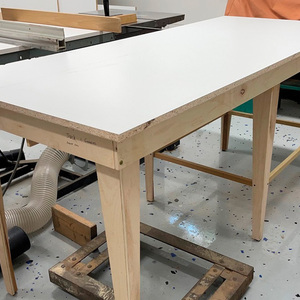the Boston Compromise…

Children of all ages love making things from wood, either from their own imaginations or what they have seen others make. There are many things that children learn to do by making something from wood.
The dire warning of Spanish born philosopher George Santayana is often quoted: “Those who cannot remember the past are condemned to repeat it”. But the pendulum is not always swinging in the wrong direction, and some things are worthy of repetition rather than avoidance. For example, many of us are hoping for a restoration of manual arts in our nation’s schools. Some folks now understand how rash it was to abandon school wood shops, and as a positive sign some new and old programs are occasionally being featured in the news. Perhaps there’s reason to hope that the tide has begun to turn and that what had been nearly forgotten in American education is ready now for repetition. At the 1876 Philadelphia Exhibition, both the Russian System of Victor Della Vos, and Otto Salomon’s Educational Sloyd were introduced to the public. Those two rival methods of manual arts wrestled with each other for dominance at MIT, within the North Bennet St. School and in the public schools of Boston until what had been called “the Boston Compromise” was reached incorporating aspects of both systems.
According to Charles A. Bennett who wrote the exhaustive two-volume History of Manual and Industrial Arts Education, the Boston compromise became the model upon which programs throughout the US were based. And once again things are happening in Boston that could have an important effect on American education. A possible renewal of manual arts training should be a matter of interest for every craftsman working in wood and if history can repeat itself, Boston has the history to get on with it.
As was the case in the 1870s and early 1880s, North Bennet St. School in Boston is at the center of the debate about the value of manual arts in schools. They are expanding their woodworking with youth program to more public schools. Part of the challenge is that what teachers observe of student enthusiasm and interest in schooling is no longer considered relevant to administrators or even parents in comparison to standardized tests and their stranglehold on learning.
No one in the 1880’s seemed to question the value of manual training in schools. The US was poised at the edge of enormous industrial growth. The need to train students to serve intelligently in agriculture and industry was a given. But the development of hand-skills was also known to have other benefits as well. Educator Otto Salomon, founder of the Sloyd School at Nääs, Sweden, whose method was introduced to the US by Gustaf Larsson at North Bennet St. School described manual arts as having two distinct purposes, one economic and the other “formative.” It was obvious that manual arts training would make students more skillful contributors to the economic needs of their communities, and that is one of the arguments made today. The less obvious contribution of manual arts that Educational Sloyd proposed was in the development of character, including a sense of shared responsibility and connectedness that brought greater meaning to families, communities and ultimately to our nation.
Sir James Chrichton Browne, writing at that time observed that “certain portions of the brain are developed between the ages of four and fourteen years by manual exercises alone” and “It is plain that the highest functional activity of these motor centers is a thing to be aimed at with a view to general mental power as well as with a view to muscular expertness; and as the hand centers hold a prominent place among the motor centers, and are in relation with an organ which in prehension, in touch, and in a thousand different combinations of movement, adds enormously to our intellectual resources, thoughts, and sentiments, it is plain that the highest possible functional activity of these hand centers is of paramount importance not less to mental grasp than to industrial success… Depend upon it that much of the confusion of thought, awkwardness, bashfulness, stutterings, stupidity, and irresolution which we encounter in the world, and even in highly educated men and women, is dependent on defective or misdirected muscular training, and that the thoughtful and diligent cultivation of this is conducive to breadth of mind as well as to breadth of shoulders.”
I will present an evening lecture and discussion in Boston on July 6, 7 PM co-sponsored by Eliot School,and North Bennet St. School to discuss the importance of manual arts (particularly woodworking) in schools, and to discuss how woodworkers can be of particular use in digging our way out of the educational morass that plagues our nation and our children. Perhaps a few readers of Fine Woodworking will be interested to attend. Few of the army of reformers of modern education are talking yet about the hands and the effects of skilled craftsmanship but woodworkers already know the close relationship between the hands and the development intelligence and character. We may be the best qualified to explain some very important points that are enumerated in 21 Reasons for for School Woodshops, a paper Jack Grube, a few others and I produced for the New England Association of Woodshop Teachers
Just in case you cannot attend, I will be discussing the same points over the next three weeks (as I always do) in my blog, Wisdom of the Hands. There are also some things we can do besides talking about woodworking with kids. While children and grandchildren have summers off, get them busy with you in your wood shop. You and they will have a wonderful time that will mean more to them than you could ever know.



















Comments
none of my four sons attended college. they all took various "industrial arts"
in high school. one works in the trade he took in school. all four of them have
worked full time through the last four years, the worst economy since the Great Depression. my daughter went to community college for massage therapy and she too has had steady work. I'm not against education; far from it. BUT... college today is overrated as the only course to a successful career and way, way overpriced. for many its a trap for long-term debt. and with the current job
market it's doubtful if many college grads and the many who went to college and didn't finish will ever be out of debt on their student loans.
generiley
Gene, the issue is greater than college vs. not college. Skilled surgeons might be considered as an example. Or a friend of mine's son who grew up helping his dad as a carpenter and now works on the super-collider at CERN. When employed at the Argonne lab he was told to go home for an early and long weekend as it would take time to get a crew in to prepare for the next steps. He took matters into his own hands and went to Ace Hardware for supplies. Rather than wait for "skilled technicians" he built the necessary test apparatus himself and was able to proceed without waiting for Tuesday. A similar story concerns Dr. Alex Slocum at MIT when working on Obama's BP fix-it team in the Gulf oil disaster. Folks asked him how he came up with a model for a device over the weekend when machine shops were closed. He had made it in his wood and metal shop by himself. Most of the "academics" on the team could hardly believe it. The separation of head from hand in learning is a disaster at all levels, pre-K through grad school. Fortunately when students can get past all the heads-only learning up through college, they get to do the real stuff that would have kept most students engaged in the first place.
By simultaneously working to improve education AND manual arts, Doug is actually doing what few in America even recognize as the crucial work of our time: restoring the foundation of a thoroughly debased society. In response to his work with kids, his writing and advocacy, as well as his own woodworking, it's hard to say it emphatically enough: great job, Doug!
MIT crops up regularly in discussions of technology. I went there myself and have a degree in math. When I was a student the school educated "generalists"--people trained to think. That skill served me well in my time, but there are now fewer positions in our economy for educated thinkers and more jobs for trained technicians.
What is the direction here? Providing "manual training" as an adjunct to the education of the select few students who will go on to think for a living may well pay off for us as a society, but it seems elitist at a time when school budgets are skewed toward "at risk" students who need all the help they can get just to survive. Providing it for the majority of students who might be directed toward a technical career means orienting the training to the needs of industry which doesn't care at all about the development of character or a sense of connectedness so long as you can work with a touch screen and pass a drug test.
Oldwindowguy, Thanks for your thoughtful remarks. If we were to really direct our resources to at risk kids, we would be giving them hands-on learning instead of employing teach-to-the-test strategies that are known failures in the long term. The effects of craftsmanship on all students of all social classes can be profound. Recent studies have shown that contrary to the direction taken in public education as a whole, engagement in the arts (including woodshop) increases test scores.
It is interesting that you mention work with a touch screen and pass a drug test. Passing the drug test, showing up on time and having an interest in doing a good job are matters of character. And it is interesting what you hear from employers. They are willing to hire employees of good character, and are finding too many lacking. Comenius, one of the first educational theorists and also one of the first advocates of manual arts as a means of education said that the craftsman and his materials arise at the same time. In other words, when we make something useful, beautiful or both, we are also shaping ourselves in higher form.
Doug and oldwindowguy--
Re: woodworking and character, about a century ago, Wallace Nutting had this to say:
"We have no right to misuse wood. We did not make it. We found it, like air, water and grass. The only possible manner of acquiring any rights over it is by putting the stamp of character upon it. The theologians tell us of sins, as if we were under obligation to a spiritual world alone. But sheer wickedness in the use of materials ought to cause even a materialist to shudder. Wood is one of the best things we have. Whether Grinling Gibbons puts his tool to it or we make a milking stool of it, men will measure us by the manner of our handling it.
"Only people with a sense of reverence for materials can make good citizens. A man must use wood well, or he will mistreat his neighbors."
Tim, Thanks for the piece from Wallace Nutting. Here is a poem from Edwin Markham that was part of the 100 poems collected for shop teachers by William L. Hunter.
We all are blind until we see
That, in the human plan,
Nothing is worth the making, if
It does not make the man.
Why build thee cities glorious
If man unbuilded goes?
In vain we build the world, unless
The builder also grows.
Log in or create an account to post a comment.
Sign up Log in